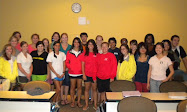Doña Bárbara is a Venezuelan novel, just like Of Mice and Men, which students read while in high school. A small difference is that Doña Bárbara was made into a Telenovela. For some younger Venezuelans, they only know Doña Bárbara as a telenovela. How do this affect the education system, and what does it say about the culture that comes with Telenovelas?
Now, it's obvious that many novels have been made into films, but a film generally follows the main storyline, and it doesn't have too much time to add multiple subplots to dilute the heart of the novel. If anything, novels made into films can't fit enough into of their storyline.
By adapting a classic novel into a Telenovela, what category does it fall into? Can we analyze it as an adaption? Should we analyze it as an adaption? Is it its own entity? These are hard questions to answer, but the fact is, all of the above are important aspects and need to be looked at. It is a one-of-a-kind telenovela. It has done something others haven't. Also, it may be a little too soon to determine how this could affect young minds, but it will definitely be an interesting study.
The cultural aspect is an intriguing one. The first page to come up when searching for Doña Bárbara through Google is the Telenovela, followed by the novel. Also, the amount of time people devote to telenovelas through the years is amazing. They hang on every episode and make it their top priority.
Is this demonstrating a strong emphasis of Telenovelas in the Venezuelan culture? Does this show an emphasis on Telenovelas over classic novels?
...It sure seems that way.



No comments:
Post a Comment
Note: Only a member of this blog may post a comment.